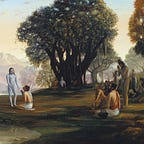Srila Vyasadava composed the Upanisads by selecting passages from the four original Vedas that deal directly with the topic of self-realization. The Aitareya and Kaushitaki Upanisads are derived from the Rig Veda, the Chandogya and Kena Upanisads from the Sama Veda, the Brihadaranyaka, Isha, Taittiriya and Katha Upanisads from the Yajur Veda and the Mundaka Upanisad, togueter with the Mandukya and Prashna are derived from the Atharva Veda.
The name "Mundaka" literally means "shaved". It has two meanings. One refers to ascetics that performed the siro-vrata, shaving their heads and renouncing the practice of fruitive activities. Another is "shaved" in the sense of shedding ignorance and focusing on the pursuit of deep spiritual knowledge, instead of being distracted by karma-kanda sacrifices and promises of elevation to the celestial planets, as common among ritualistic followers of the Vedas.





